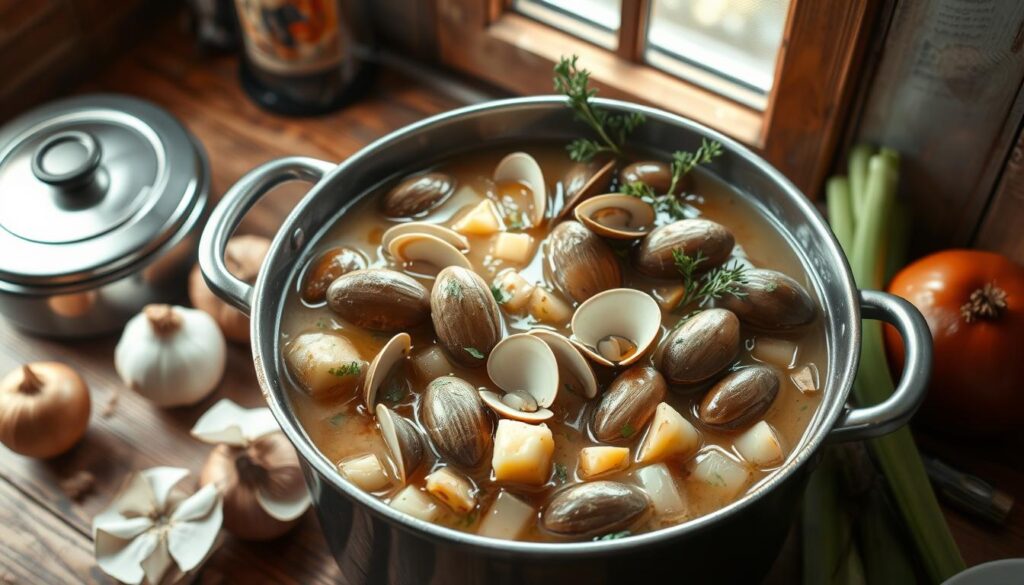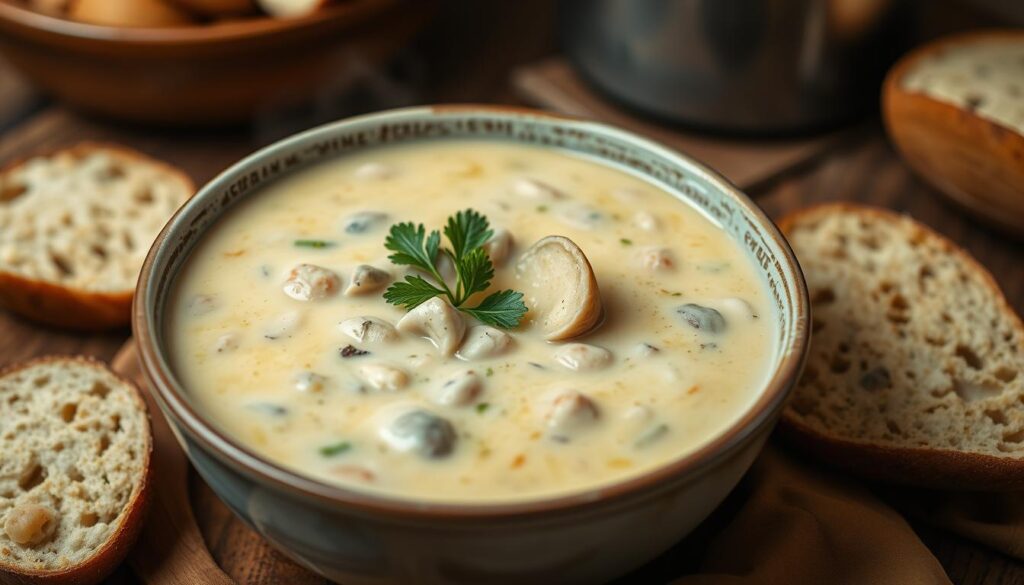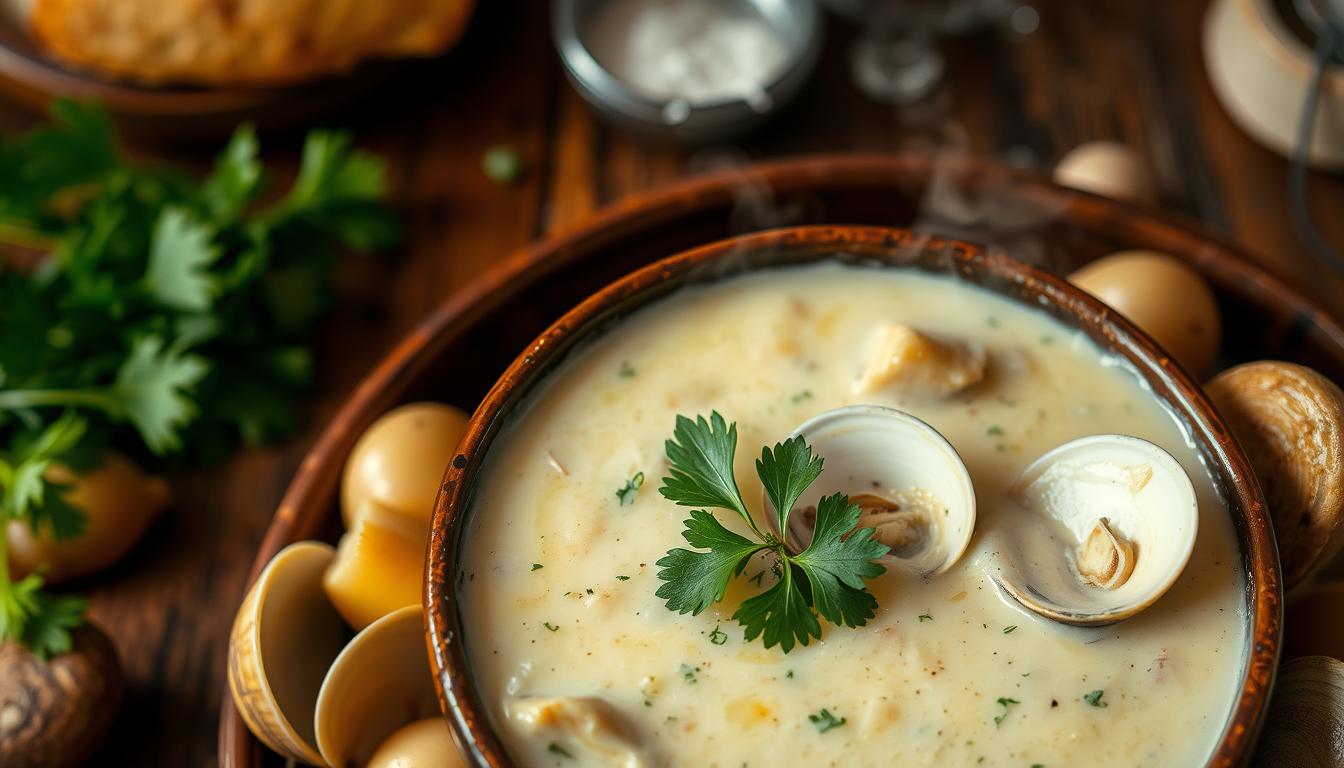New England Clam Chowder is a beloved American dish. It’s creamy and filled with bacon, potatoes, and tender clams. This soup is perfect for cold nights and is a favorite comfort food.
This recipe is restaurant-worthy. It’s made in the traditional New England style. It uses simple ingredients but has great flavor. You can use fresh or canned clams and it’s ready in under 90 minutes.
Table of Contents
Understanding the Rich Heritage of New England Clam Chowder
New England clam chowder is a beloved coastal dish with a long history. It comes from the northeastern United States, especially Massachusetts and Maine. This creamy soup has changed over time, showing the many flavors of New England.
Origins and Regional Variations
The first written chowder recipe was in 1751, in the Boston Evening Post. Over years, it has developed unique tastes for different areas. Classic New England clam chowder is creamy, while others like Manhattan and Rhode Island chowders are different.
Traditional vs Modern Preparations
Traditionally, the chowder used salt pork, potatoes, onions, and fresh clams. Later, potatoes replaced hardtack, and bacon became common instead of salt pork. Now, some cooks add new touches, like frozen clams or crab and shrimp.
Cultural Significance in New England Cuisine
New England clam chowder is more than a dish; it’s a key part of the region’s food culture. It’s often served with oyster crackers, showing its place in new england cuisine. It reflects the area’s love for the sea and its seafood.
Essential Ingredients for Authentic Clam Chowder
Making the perfect New England clam chowder needs careful picking of key ingredients. These ingredients work together to create the creamy, briny, and comforting flavor we love. Whether you’re a pro chef or a home cook, knowing the essential parts is key to making a great potato chowder.
At the core of this soup are the clams. You’ll need a mix of fresh clams, like chowder or littleneck, and canned chopped clams. This mix gives the right texture and flavor. About 6 pounds of fresh clams or three 6.5-ounce cans of chopped clams are needed for a batch.
Clam broth is also crucial, as it’s the base of the chowder. You can make it by simmering clam shells in water or buy it pre-made. Chicken broth or stock adds depth and richness to the flavor.
| Ingredient | Quantity |
|---|---|
| Clams (fresh or canned) | 6 lbs fresh or 3 (6.5 oz) cans chopped |
| Bacon (or salt pork) | 6 slices, cut into 1/2″ strips |
| All-purpose flour (or GF flour) | 4 tbsp |
| Potatoes, peeled and diced | 1 1/2 lbs (about 6 medium) |
| Milk (any kind) | 2 cups |
| Heavy cream | 1 cup |
| Herbs and seasonings | Bay leaf, Worcestershire sauce, Tabasco, thyme, salt, pepper |
Other key ingredients include bacon (or salt pork), flour for thickening, potatoes for texture, and milk and heavy cream for creaminess. Don’t forget the herbs and seasonings like bay leaf, Worcestershire sauce, Tabasco, thyme, salt, and pepper.
With these ingredients ready, you’re on your way to making a delicious clam chowder. It will celebrate New England’s rich culinary heritage.
Selecting and Preparing Fresh Clams
When making a true New England clam chowder, the quality and prep of the clams matter a lot. Quahog clams, also known as cherrystone or littleneck clams, are the best choice. They have the right texture and taste to go well with the creamy broth and other ingredients.
Types of Clams Best Suited for Chowder
Quahog clams are the top pick for New England clam chowder. They are known for their firm texture and strong flavor. These clams come in different sizes, like littlenecks, cherrystones, and quahogs.
- Littlenecks: The smallest and most tender variety, typically around 2 inches in diameter.
- Cherrystones: Slightly larger than littlenecks, with a diameter of around 2.5 inches.
- Quahogs: The largest of the three, measuring 3 inches or more in diameter, offering a more pronounced briny taste.
Cleaning and Shucking Techniques
Before using fresh clams in your chowder, clean and prepare them well. First, check if the clams are tightly shut. Throw away any that are open or damaged. Farm-raised clams are cleaner, but a quick rinse under cool water can remove sand or debris.
Soaking the clams in a saltwater solution for 15-30 minutes can help remove more impurities. Shucking the clams is delicate but can be mastered with the right tools and technique. Use a sturdy knife to open the shells, then carefully remove the meat without spilling the clam liquor.
Using Canned Clams as an Alternative
Canned clams are a good option for those who want a quicker prep. Choose high-quality canned clams packed in their own juices. Chop them finely to avoid a rubbery texture in the chowder.
By choosing and preparing fresh or canned clams well, your New England clam chowder will be a true delight. It will be full of briny, creamy flavors that make this dish so loved.
The Perfect Base: Creating Rich Clam Broth
The heart of a great clam chowder is its broth. Start with juices from fresh clams or top-notch canned clams. If using fresh clams, strain the liquid to get rid of sand and shells. This will give you about 4 cups of pure clam juice.
Choosing canned clams? Add bottled clam juice or water to the drained liquid to hit the 4-cup mark. This broth is the core of your chowder, bringing the sea’s essence to your dish.
To deepen the flavor, mix in some bacon drippings. The smoky taste of bacon blends well with the salty clam juice. This makes your seafood soup base truly special.
| Ingredient | Quantity |
|---|---|
| Fresh Clams | Approximately 20 oz, or 2-3 cans |
| Bacon Drippings | 2-3 tablespoons |
| Clam Juice (canned or bottled) | 4 cups |
With this rich clam broth as your base, you’re ready to make an amazing New England-style clam chowder.

Role of Bacon and Aromatics
In the world of comfort food, New England cuisine shines with its creamy clam chowder. The dish’s heart is a perfect mix of flavors. Bacon and aromatic ingredients play a big role in this.
Proper Bacon Selection and Preparation
For New England clam chowder, thick-cut, smoky bacon is the best. It adds a strong flavor. Cook the bacon until it’s crispy, then save some fat to cook onions, celery, and garlic.
This method adds a smoky taste and makes the chowder rich and creamy.
Essential Herbs and Seasonings
- Fresh thyme adds an earthy and minty taste, deepening the chowder’s flavor.
- Chopped parsley brings a fresh and herbaceous note, enhancing the dish.
- Bay leaves add a subtle yet distinct flavor when simmered in the broth.
These herbs and seasonings work together, making the creamy soup a true masterpiece.
| Ingredient | Quantity |
|---|---|
| Bacon slices | 4 |
| Yellow onions | 1 |
| Celery stalks | 2 |
| Garlic cloves | 3 |
| All-purpose flour | 1/4 cup |
| Clam juice (8-oz. bottle) | 1 |
| Half-and-half | 1 cup or more |
| Vegetable broth | 1 cup |
| Russet potatoes | 2 |
| Chopped clams cans (6.5-oz. each) | 2 |
| Chives | 3 tablespoons |
| Oyster crackers | for serving |
By choosing and preparing these key ingredients, you can bring out the true taste of New England clam chowder. It blends the savory bacon with the complex flavors of herbs and seasonings.
Mastering the Creamy Texture
The secret to a truly outstanding creamy soup and comfort food like New England Clam Chowder lies in mastering the rich, velvety texture. This beloved chowder recipe achieves its creaminess through a harmonious blend of heavy cream and a well-executed roux.
For the best results, reach for heavy whipping cream rather than lighter alternatives. The higher fat content of heavy cream provides the ultimate in luxurious mouthfeel. To create the perfect roux, begin by cooking the flour with your aromatic ingredients, such as diced bacon, onions, and garlic. This cooking process helps prevent any undesirable lumps and ensures a seamless, silky texture.
If you prefer an even thicker consistency, consider incorporating a flour or cornstarch slurry towards the end of the cooking process. Slowly whisk in the starch mixture until the desired thickness is achieved, taking care not to over-thicken the chowder. The key is finding the right balance between creamy richness and a comfortably spoonable consistency.

With these techniques in your arsenal, you’ll be well on your way to mastering the creamy, indulgent texture that defines the quintessential New England Clam Chowder. Savor every velvety spoonful of this timeless comfort food classic.
Potato Selection and Preparation
Choosing the right potatoes is key to making a great potato chowder. For New England Clam Chowder, red potatoes are a top choice. They keep their shape and add a creamy touch to the creamy soup. But Yukon Gold or russet potatoes also work well, each adding its own flavor and texture.
It’s important to dice the potatoes evenly for even cooking. You can peel them or leave the skins on, depending on what you like. Cut them into 1/2-inch cubes and simmer them in the clam broth until they’re tender, about 20 minutes.
As the potatoes cook, they release starch that thickens the chowder. This makes it creamy and perfect with the clam flavors. By picking and preparing the potatoes right, your potato chowder will be a true New England classic.
Best Potato Varieties for Chowder
- Red potatoes
- Yukon Gold potatoes
- Russet potatoes
Proper Cutting and Cooking Techniques
- Dice the potatoes into uniform 1/2-inch cubes
- Choose to peel the potatoes or leave the skins on, depending on personal preference
- Add the diced potatoes to the simmering clam broth and cook for approximately 20 minutes, until tender
- The natural starch released from the potatoes will help thicken the chowder
“The key to a truly exceptional potato chowder lies in the careful selection and preparation of the potatoes. By choosing the right variety and dicing them to perfection, you can unlock the natural creaminess that transforms this comfort food into a culinary masterpiece.”
Step-by-Step Cooking Process
Making a true New England clam chowder is a fun journey. Start by cooking a few strips of applewood-smoked bacon until crispy. Remove the bacon, keeping the fat to cook the veggies.
Use the bacon fat to sauté a yellow onion, tender carrots, and fragrant leeks. Add a bit of all-purpose flour to thicken. Then, whisk in clam juice and water, along with fresh thyme and diced new potatoes. Let it simmer until the potatoes are almost tender, about 15 to 20 minutes.
- Crisp bacon and sauté aromatics in the rendered fat.
- Make a roux with flour, then whisk in clam juice and water.
- Add potatoes and herbs, and simmer until potatoes are tender.
- Stir in chopped clams, cream, and additional seasonings.
- Gently heat through, being careful not to overcook the clams.
Next, add the chopped clams and a splash of cream or half-and-half for creaminess. Heat the chowder gently, avoiding overcooking the clams. Season with salt and pepper, then serve hot. Top with crispy bacon, fresh chives, or oyster crackers.
| Ingredient | Quantity |
|---|---|
| Bacon | 3 strips |
| Unsalted Butter | 5 tablespoons |
| Yellow Onion | 1/2, diced |
| Carrots | 1, diced |
| Leeks | 1, diced |
| Fresh Corn | 2/3 cup |
| Fresh Thyme | 1 1/2 tablespoons |
| New Potatoes | 1 1/2 cups, diced |
| Clam Juice | 2 1/2 cups |
| Chopped Clams | 2 1/2 cups |
| Cream or Half-and-Half | 1 cup |
This chowder recipe is quick to make, under an hour. It’s a tasty addition to your New England cuisine. Enjoy the rich, creamy broth and tender seafood soup that warms you up.
Achieving the Perfect Consistency
Making the perfect creamy soup is key to a great chowder recipe. The ideal comfort food should be creamy but not too thick. If you want it thicker, there’s a simple trick.
At the end of cooking, mix 2 tablespoons of flour with a bit of hot liquid from the pot. Slowly add this slurry to the chowder. Boil for 2-5 more minutes. This will make the chowder thicker and creamier.
Before serving, taste and adjust the seasoning. The saltiness can change based on the clams used. The chowder should taste rich, with the clams, bacon, and veggies standing out.
| Ingredient | Amount |
|---|---|
| Littleneck Clams | 16 well-scrubbed and rinsed |
| Chopped Canned Clams | 3 (6.5-ounce) cans, with juices |
| Russet Potatoes | 1 1/2 pounds, peeled and cut into 1/2-inch cubes |
| Dry White Wine (optional) | 1/2 cup |
| Diced Bacon | 6 ounces |
| Onion | 1 large |
| Celery Ribs | 3 |
| Garlic Cloves | 5, minced |
| Flat-Leaf Parsley | 1/4 cup, minced |
| Instant Mashed Potato Flakes | 1-2 teaspoons, as needed |
With the right consistency and seasoning, you can make an amazing New England Clam Chowder. It will impress your taste buds and leave a memorable taste.
Storage and Reheating Tips
Making the perfect comfort food like New England Clam Chowder is an art. But it doesn’t stop when you finish cooking. Keeping the creamy texture and delicious flavors of this chowder recipe is key to enjoying it fully.
Proper Storage Methods
For your New England Clam Chowder to stay delicious, store it in an airtight container in the fridge for up to 5 days. The taste gets even better after a day, making it great for leftovers. But, because of the cream, freezing is not a good idea as it can separate when thawed.
Best Reheating Practices
When reheating your chowder, gentle heat is important. This keeps the clams tender and the broth creamy. Warm it on the stovetop over medium-low heat, stirring often to avoid scorching. You can also microwave it in short bursts, stirring between each interval.
When reheating, adding a bit of milk or stock can help keep the creamy texture. These simple steps ensure you can enjoy the comforting taste of this seafood soup again and again.
Conclusion
New England clam chowder is a favorite comfort food in America. It shows the rich food culture of the Northeast. The creamy texture, tasty clams, smoky bacon, and potatoes make it a cozy dish for any time of year.
Choosing fresh or canned clams, you can make it just like a restaurant at home. This recipe makes sure you get great results.
Clam chowder can be made your way, from how thick to how seasoned. It’s a true taste of New England cuisine. Every bite brings warmth and a sense of home.
It’s a dish that connects us to the coastal areas that love it. It’s a mix of old traditions and new twists.
Make this clam chowder a part of your cooking world. It’s a classic comfort food that’s also very flexible. Enjoy its creamy taste and explore new ways to make it.

